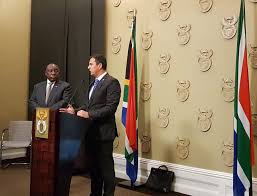STAFF REPORTER
DEMOCRATIC Alliance leader John Steenhuisen has lambasted President Cyril Ramaphosa over the state of the country and his handling of the Covid-19 pandemic.
In his “True State of the Nation” address, Steenhuisen criticised Ramaphosa for the government’s handling of the pandemic and blamed him for the closure of businesses affected by the lockdown regulations.
Steenhuisen also slammed the president for ANC cadre deployment, which he blamed for the country’s financial woes.
“We know almost everything the president said about his government’s efforts to procure vaccines has been a distortion of the truth to create the impression they have been busy for the past six months, while in reality they only woke up in January,” said Steenhuisen.
“We already knew this from statements made by the vaccine suppliers themselves, but this was confirmed in a letter from the department of health to Treasury in which it requested a deviation from normal procurement procedures in order to acquire vaccines. That letter was only sent on January 7 this year.”
He said Ramaphosa blamed wealthy countries for hoarding vaccines but in reality it was SA’s fault that it was late to secure vaccines when other nations were doing so in May, June and July 2020.
“The failure to procure vaccines when they were available to us, and the failure to publish a detailed and transparent rollout plan, are a violation of government’s constitutional obligations,” said Steenhuisen.
“We have asked the high court to compel government to make public all their dealings with vaccine suppliers as well as their rollout plan, as they had to do 20 years ago when the Treatment Action Campaign took them to court to get clarity on their antiretroviral plan.”
He also laid into Ramaphosa and the ANC for revelations at the state capture inquiry about shenanigans in the State Security Agency (SSA).
“It is inconceivable that in a functioning, accountable democracy, a governing party that has been exposed for doing what the ANC has done would remain in office,” he said.
“Forget for a moment about the arms deal and the Guptas and Bosasa and Nkandla and the recent PPE feeding frenzy. Each of those on its own should have ended this government, but let’s pretend they never happened.
“What went on over the course of a decade at the SSA with billions of rands of public funds is nothing short of treason. If a revelation of this nature and magnitude does not trigger resignations, or at the very least dismissals, we have a fundamental flaw in our democracy.”
He slammed Ramaphosa for not firing those implicated in the wrongdoings in the report by Sydney Mufamadi, former chairperson of a high-level review panel into the SSA, which he testified about at the inquiry.
“The president knew, back then [in 2018], what was going on and who was implicated. Instead of firing the likes of [former state security minister] David Mahlobo and [former SSA director-general] Arthur Fraser, he found jobs for them in his administration.
“Whenever someone tries to tell you about the so-called ‘good ANC’ trying to fight back against the so-called ‘bad ANC’, just remind yourself of this story.
“President Ramaphosa was given a report that spelt out, in great detail, the biggest scandal in which his government had ever been involved. In this report, he was given a recommendation to set up a task team to further unpack the events of the scandal, as well as a recommendation that he instruct law enforcement bodies to investigate and charge those involved.
“That was almost three years ago. Not only did Ramaphosa not follow these recommendations, he redeployed the main suspects in his own government,” said Steenhuisen.
He said state capture was not only perpetuated under former president Jacob Zuma but was a project of the ANC dating back from when the party adopted its cadre policy.
“Cadre deployment doesn’t even try to disguise its objectives. It states upfront that the aim is to extend ANC control over all levers of power in the state,” said Steenhuisen.
“This includes the civil service, all state-owned entities, the Reserve Bank, the National Prosecuting Authority and SA Revenue Service, the Electoral Commission, as well as chapter nine institutions such as the public protector and the Human Rights Commission.”
(Source: INSIDE POLITICS)



